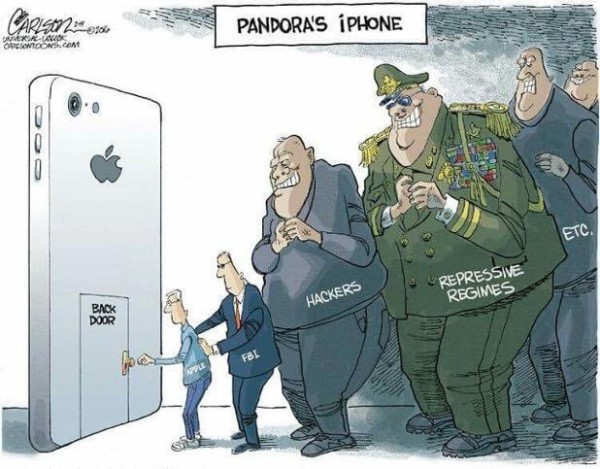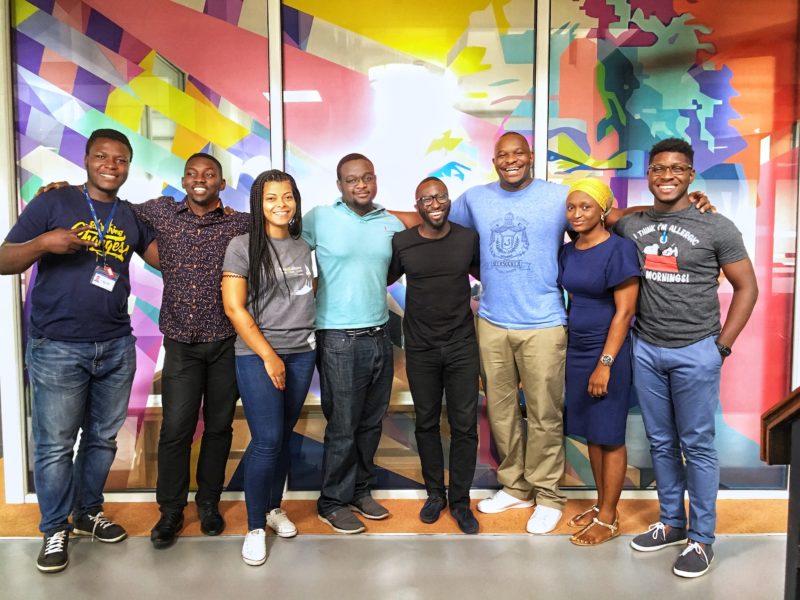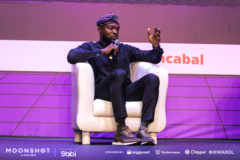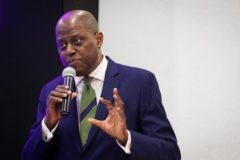I’d promised myself that I wouldn’t write about it.
And for good reason too. These are some of the questions I ask myself before commenting on any topic:
1. Do I understand the facts of the case?
2. Is my point of view completely new? Impossible. But, Is it objective?
3. Do I have information about this topic that no one else has, or an angle no one else has brought up? Am I adding value to the conversation, or merely regurgitating opinions I’ve read on the internet? …and finally…
4. Is this the best way to spend my time right now?
In the past few days, I’ve gotten many requests for comment, and seen so many points of view (some of which I think are really, really weird) about this topic, that I decided to write about it. By the way, in case you are wondering, the answer to my filter is YYYN.
So here goes:
Long ago, in a distant land…I, Aku, shapeshifting master of darkness, unleashed an unspeakable evil…
My opinions about “it” are premised on these statements:
1. I do not trust the US government.
2. I trust Apple.
3. I fail to see how insecure iPhones will curb terrorism.
Let’s begin, shall we?
You’d have to be living under a rock not to have heard about the Apple-vs-FBI conundrum. But for the benefit of the more…lithodomous…amongst us, you can read all about it here.
Now, I’ve seen some truly…interesting…points of view.
@FvckBvnky @SHIAMANI see Im all for consumer peace of mind and all that but I firmly believe the government has the right to spy if you will
— Et nihil infernae terruit ❤ (@Kalei53scop3) February 23, 2016
@FvckBvnky @SHIAMANI or gently watch over all its citizens , if you have nothing to hide why should you fear government scrutiny ?
— Et nihil infernae terruit ❤ (@Kalei53scop3) February 23, 2016
Haha. In the first place, what does gently watch even mean?
Place cameras in everyone’s homes. But do it gently. Log everyone’s Google search requests. But do it gently. Hell, even censor public opinion about politicians on the internet. As long as you make sure you do it gently.
And in answer to the question: no I don’t fear government scrutiny. I have a right to privacy and I will not relinquish access to my information simply because some government says it will help with security. Heh.
@SHIAMANI hassle ? And then say apple wins and the government doesn't get what it wants how can it defend it citizens!?
— Et nihil infernae terruit ❤ (@Kalei53scop3) February 23, 2016
Brilliant. Because if the iPhone 5C had not been recovered in the first place or if the terrorist used a Nokia 3310, the FBI would have thrown up its hands and said, “sorry guys, we can’t catch the accomplices, or stop future attacks because we don’t have access to Syed’s fucking iPhone”.
@SHIAMANI but in this age of high information traffic why should data be so protected ?? Especially from the government?
— Et nihil infernae terruit ❤ (@Kalei53scop3) February 23, 2016
(‘-’ )( ._.)
This is me wondering what information volume has to do with anything.
Even the notion that the “government” is an entity to be trusted absolutely is absurd (let’s all ignore the fact that the FBI director has said before, that the government wants backdoors into our devices). The government is not some incorruptible individual that means well for its well meaning citizens.
It’s made up of individuals. Individuals who are far from incorruptible. And if we’re being honest, we’d admit that more often than not, it’s made up of very corrupt individuals.
Remember that time when we discovered the NSA has an illegal collection of…I don’t know…EVERYONE’S PHONE RECORDS?
Oh my god, why would you even bring that up, Osarumen? That has nothing to do with this. This is about terrorism, & the safety of the good peoples of America.
But it gets better…
@SHIAMANI @businessinsider I think he has a point ..amean its national security we're talking about , just one off access ..just one time
— Et nihil infernae terruit ❤ (@Kalei53scop3) February 23, 2016
OKAY STOP!
EVERYBODY. JUST…STOP.
I should probably state at this point, that there are these little somethings called precedents.
When you concede to one unreasonable demand, the next time it comes (even from a different party), it begins to look a lot less unreasonable.
And if you think for a second that this is about just this San Bernardino case, then read this.
For those of you who didn’t bother clicking on that link, the headline reads: New Court Filing Reveals Apple Faces 12 Other Requests to Break Into Locked iPhones.
Again. This is not about the US government wanting to protect its precious citizens.
If anyone who hasn’t closed this article still doubts me, I should probably let you know that our friends at the MIT (read: really really smart people, who usually know what they are talking about) published a paper in July 2015, titled Keys Under Doormats, holding pretty much the same position I do now.
If a country like China or North Korea (no, I didn’t misspell that) demanded that Apple assist in its censorship efforts today, or install a backdoor so the government could listen in on messages to prevent corruption (see how stupid that sounds?), Apple would decline. And no one would make too much of a fuss about it afterwards.
Now, if the FBI gets its way, and gets Apple to write an alternate (read: insecure) version of iOS to “help them preempt terrorism”. The dynamics of the conversation with the Chinese government have changed completely.
To put it in Nigerian-speak…
“You do am for my guy, why you no go fit do am for me?”
And then, there’s this.
.@SkweiRd Tim Cook should have unlocked those phones in silence. Then nobody knows and no unfounded threats. Instead he opened his big mouth
— Adeyinka Amurawaiye (@ADYK_41) February 23, 2016
Here’s the thing. In a vacuum, this would be the smartest thing to do. Roll over like the FBI’s puppy, and not tell anyone about it. But this is not a vacuum, and things are rarely ever that simple.
Imagine Tim Cook kept his big mouth shut, and silently unlocked the iPhone(s), and some unsavory party gained access to people’s information via the same key under the doormat.
Imagine the collosal shitstorm that would ensue soon after.
Now, imagine what your point of view about the subject would be.
My guess is, everyone supporting the FBI now would quickly attempt to throw Apple under the bus. “I always knew they were all about exploiting their customers for profit. I mean, look at how they keep changing their ports to force customers to buy expensive accessories”.
Remember when I said I trusted Apple?
I don’t trust them because they are trustworthy. No. I trust them because they have direct economic interests in keeping my information safe, since one of their major value propositions is the preservation of the end user’s data. They do not provide free services and then mine their customers’ data to serve them targeted ads, like their more…alphabetical counterparts.
It’s not a choice between privacy and security.
My good friend, @Mr_Oyedele was quick to point this one out to me. Americans actually want Apple to open the iPhone(s) for the FBI, according to polls.
Even iPhone owners believe Apple should unlock the San Bernardino shooter's iPhone https://t.co/OcntdCSP4x pic.twitter.com/U6AePIzoYY
— Business Insider (@businessinsider) February 23, 2016
Terror cases like this one, bring out an avalanche of emotions in everyone, and so it’s very easy for the FBI to spin the narrative that Apple is the only stumbling block between them and justice for the victims.
If the FBI came and said something much closer to the truth like, “Hey guys, we want Apple to help unlock this iPhone (and 12 others) just this once so in the future we can pressure them to do it again and in the process, access information about you whenever we needed it”, I’m sure the results of that poll would be very different.
Keep in mind that the FBI really isn’t asking Apple to unlock the iPhone. They are essentially trying to force Apple to force Apple engineers to write code to enable them (FBI) to do it. Certain parties argue that that’s a violation of their free speech rights (it’s no secret that information typed on a laptop counts as speech).
In all, remember this:
Security and privacy are not two mutually exclusive concepts.
Terrorists will find ways to commit acts of terror, whether Apple helps the FBI or not. Insecure iPhones do not directly translate to a safer society.
Telegram founder, Pavel Durov put it excellently, when he came under heavy criticism because ISIS operatives were using his secure messaging app to communicate.
“I think that privacy, ultimately, and the right for privacy is more important than our fear of bad things happening, like terrorism. If you look at ISIS — yes, there’s a war going on in the Middle East. It’s a series of tragic events. But ultimately, the ISIS will always find a way to communicate within themselves. And if any means of communication turns out to be not secure for them, they’ll just switch to another one. So I don’t think we are actually taking part in these activities. I don’t think we should be guilty or feel guilty about it. I still think we’re doing the right thing, protecting our users’ privacy.”
Guess what happened when Durov blocked 78 ISIS public channels on Telegram? They went and developed an ad-hoc solution — their own messaging app.
‘Nuff said.
Secure iPhones don’t promote terrorism. Terrorists do.
Photo Credit: Chris Potter via Compfight























